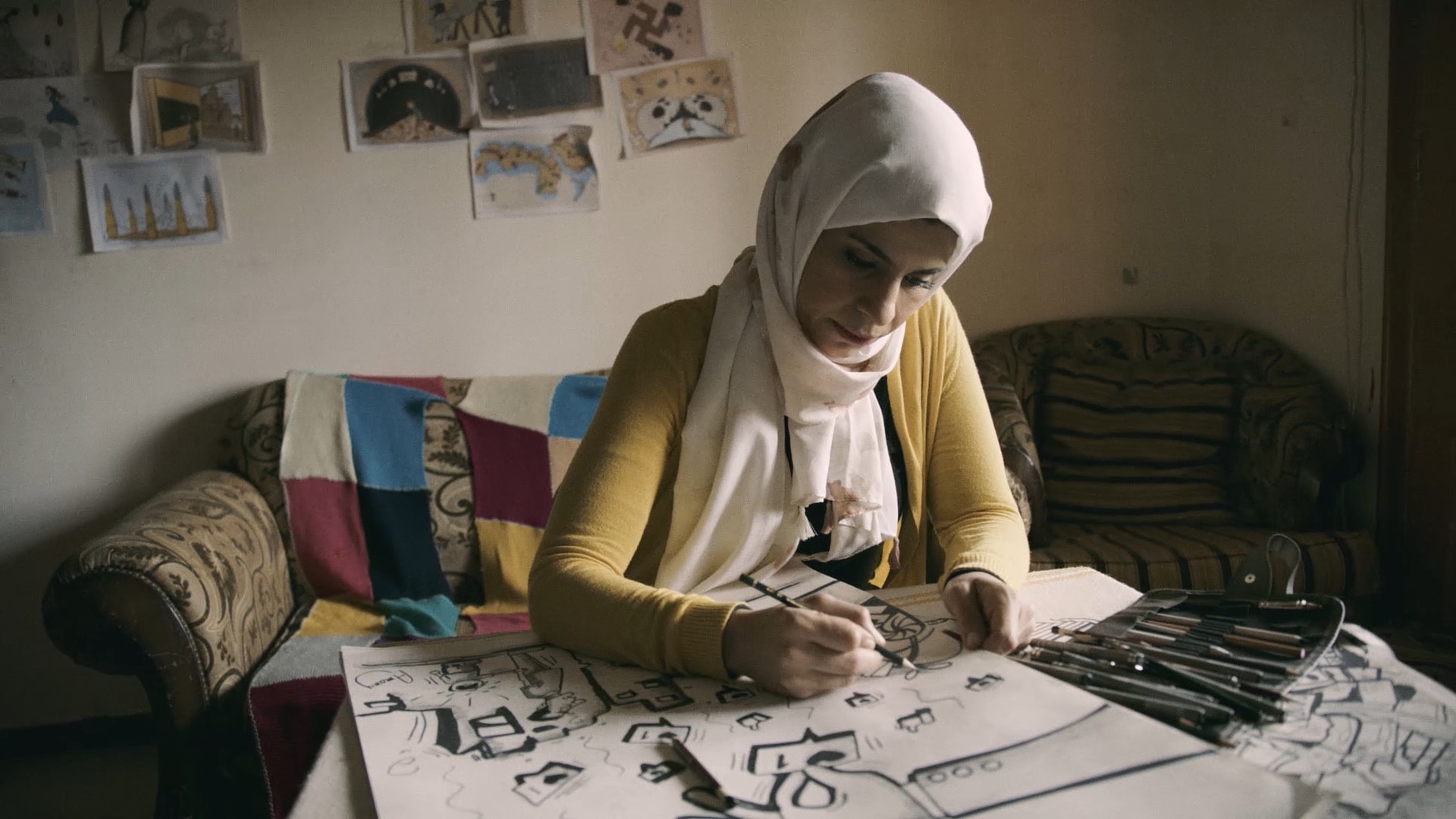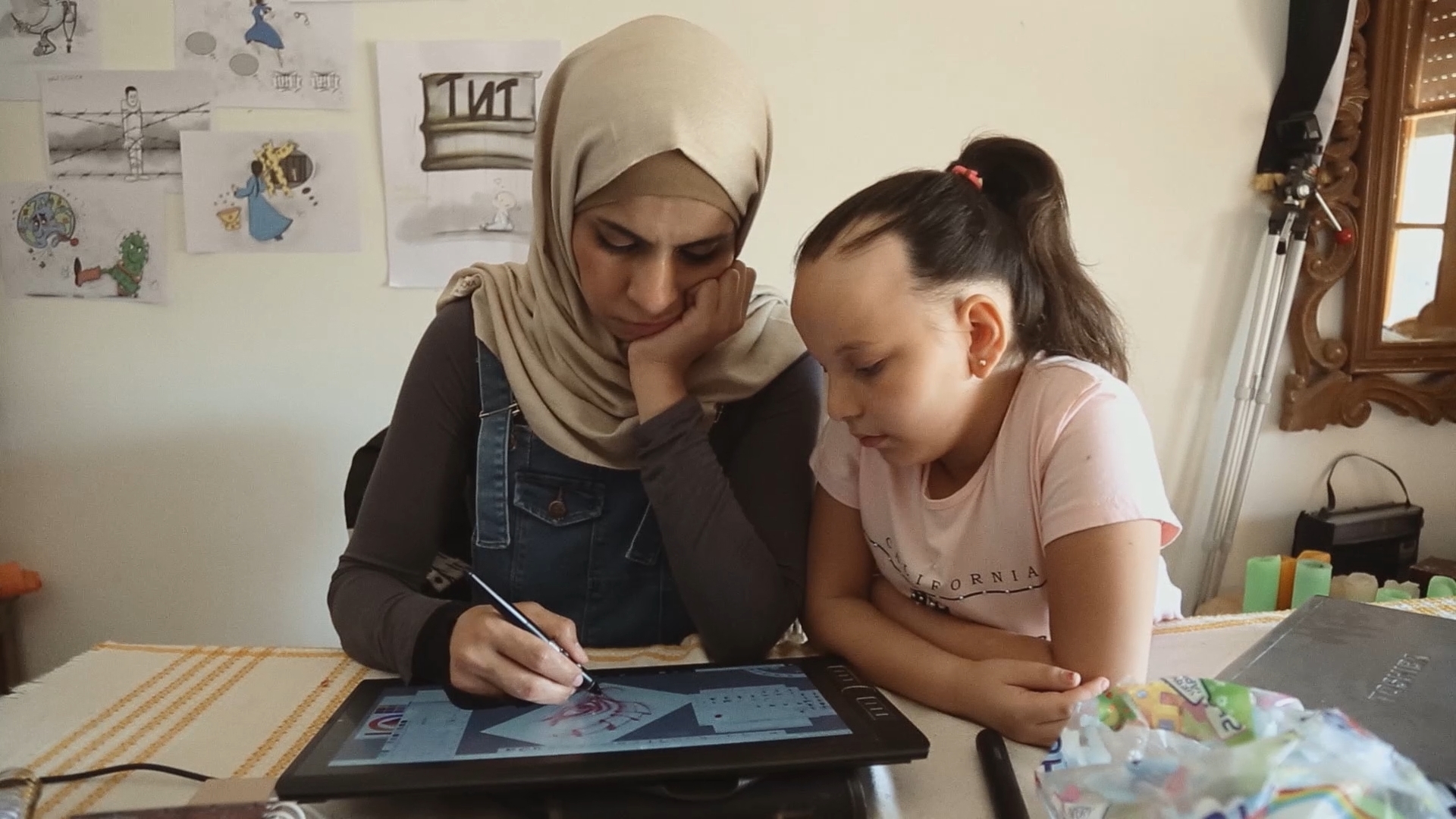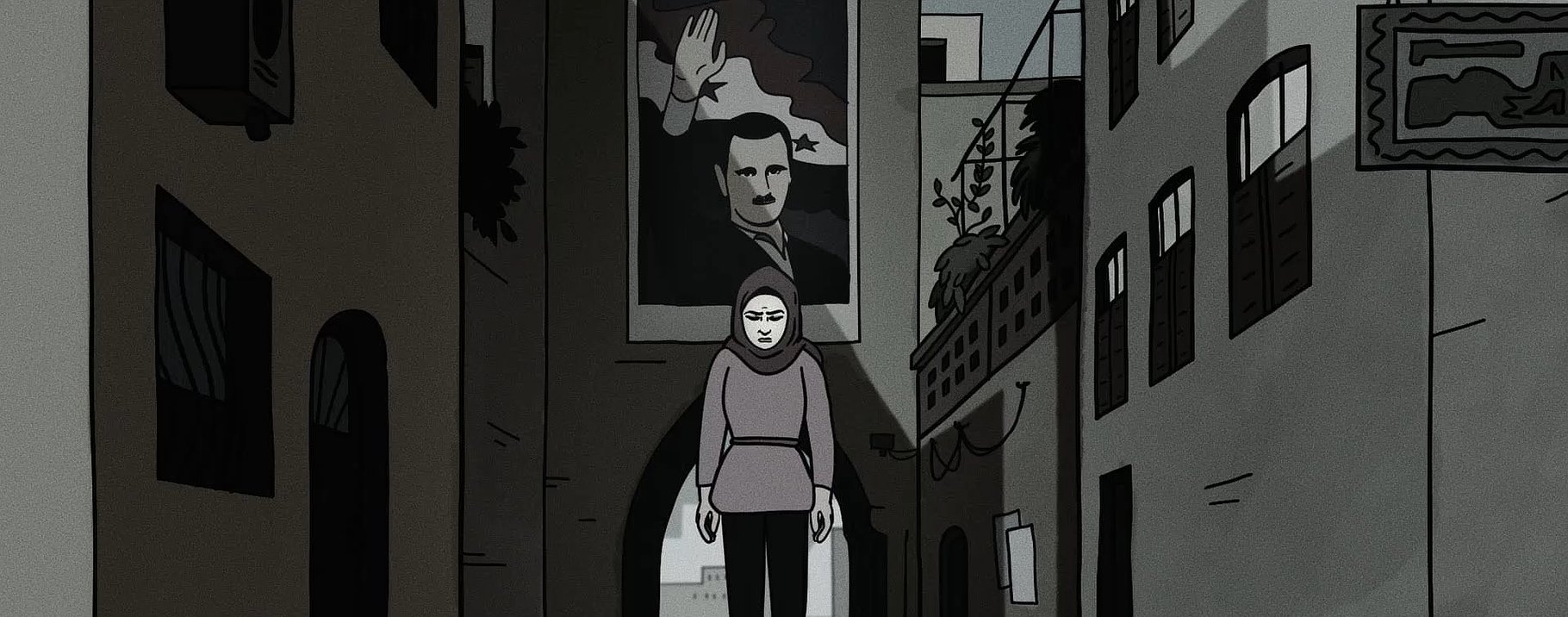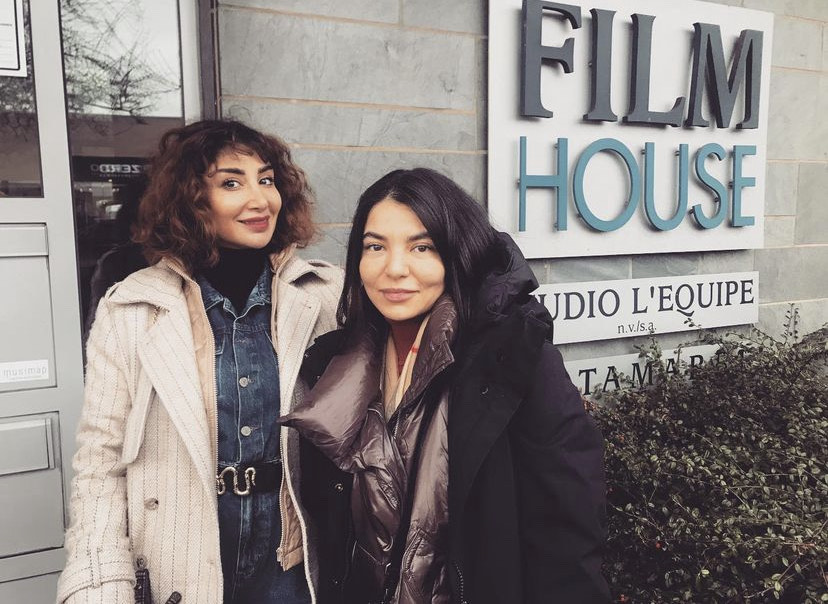A Syrian documentary, “Behind The lines”, will have its premiere this month in the CANNESERIES in France and Vision du Reel in Switzerland. It was directed by two members of The Marie Colvin Journalists’ Network; Alaa Amer and Alisar Hasan. The film tells the story of Amani, the first female cartoonist in Idlib, who uses art to describe the challenges facing women in Idlib. The province is under constant bombardment by the Syrian regime, and is controlled on the ground by Jihadist groups and social patriarchy. The film was shot over three years. During that period, Alaa and Alisar had to work remotely because the conditions on the ground were too dangerous, and Amani almost left her family and life in Idlib.
How did you meet each other? And how did you come up with the idea for this film?
We were looking for a new way to tell the story of the people in Idlib, an alternative approach to the crude way in which their suffering is being reported
Alaa: I met Alisar in Istanbul when I applied for a job at Sout Raya, a radio station that she had set up and managed. I worked there as a director for programmes, and a year later we both moved to work with Syria TV. From the beginning, our relationship wasn’t strictly professional. We became friends, and when we left the television we felt that we should work together. Alisar had experience in documentaries - she is the screenwriter of the 2020 Academy Award-nominated “The Cave” - and so we decided to make a documentary together.
Alisar: We were looking for a new way to tell the story of the people in Idlib. We wanted an alternative approach to the crude way in which their suffering is often being reported. We wanted to show how people there are trying to make a change. I saw a report on Amani, a woman who draws political cartoons, so I contacted her and proposed making a documentary about her life, and she immediately accepted. In the beginning, we didn’t have any funding, but Alaa and I wanted to work together because we have so much in common as friends. So we financed the first stage of the project, and a year later we found a production company. It took us three years to film.

It’s not easy to have two directors working together on any film. How did you manage to do this and divide the tasks?
Alaa: There was never really a discussion about the distribution of tasks. Alisar and I are very much alike. I know how she thinks and our decisions complemented one another. There were some decisions that took days for us to make. But in the end, all of them stemmed from common beliefs. There wasn’t a single decision that I felt was Alisar’s and not mine. We agreed on everything.
In the first scene of the film, you both call Amani to tell her that you cannot come to Idlib because the situation there is too dangerous, and would like to send a cameraman, Abdo, to film with her. How did you manage to direct everything remotely over the course of three years?
Alisar: It was a huge challenge, and we had long and intense discussions with Amani. Things would have been a lot easier had we been there. It is difficult to give filming instructions remotely, and sometimes we would have to wait for days before receiving the footage.
Alaa: Amani also had to convince her family to agree to having a cameraman come to their home and film with her because they are conservative. But she has a strong personality and knows how to convince people. Amani’s family also trusts and supports her, otherwise Amani wouldn’t have been able to help us get this film made with Abdo being there almost everyday.
Alisar: We wanted the viewers to experience Amani’s everyday and forget that the camera was there. This is why we didn’t interview her in a conventional way. Abdo would sit there for days filming her going about her day, interacting with her niece, Bissane, and the women who came to her home for drawing lessons. This form of documentary filmmaking takes time to be able to build a narrative. We also knew that Amani was seriously thinking about leaving Idlib, so we had to keep filming with her until she finally made a decision because that would be have been the end of the story. But in addition to that, we were filming during war, and this added more challenges for us.
How did the war, and the Corona pandemic, affect the filming?
Alisar: We had problems almost every day. Sometimes, Abdo couldn’t go to Amani’s house because he had no gas for the car, or because there was no harddrive to store the footage. We also didn’t want the crew to travel or film during the bombardment because we didn’t want them to put their lives at risk. But one night, there was an intense bombardment and Abdo decided to go alone to Amani’s home to make sure she was fine. He filmed with her that night without our knowledge. We decided to use shots from that night as part of the final scenes of the film.
Alaa: Sometimes, the team would be in the middle of filming when an air raid suddenly starts. Anyone who’s ever lived in a war knows that, with time, bombs become part of everyday life. So our crew would continue to work as an attempt to find a way to carry on with life. As for the Corona pandemic, people in Idlib dealt with it differently. Of course they were afraid of the virus which caused many deaths, but explosions and barrel bombs were a much bigger threat to them.
We hesitated a lot about including a scene of Bissane in the film because we were afraid it would affect her when she grows up. But we felt this scene wasn’t just about her. It said something about the impact of this war on all the children in Idlib

What was the most difficult situation you’ve had to deal with in this film?
Alaa: One of the most difficult scenes for me in this film is of Bissane, Amani’s niece, on her birthday. She had lost a lot of her hair, including her eyebrows, because of the fear she experienced during the war. On her birthday, she was crying because she had no eyebrows, so Amani decided to draw them in for her. I hesitated a lot about including this scene in the film because I was afraid it would affect Bissane when she grows up. But then we felt this scene wasn’t just about Bissane. It said something about the impact of this war on all the children in Idlib. Her parents had also given us their consent. When Bissane watched the film with her mother neither one of them were upset about it. I watched this scene countless times and it still affects me deeply.
Alisar: Bissane is a brave fighter like her aunt, Amani. There were so many difficult situations that happened during the filming which we couldn’t include in the final cut. Amani went through some very hard times and sometimes we had to stop filming. But everytime she would pick herself up and start filming again with renewed energy.
Alaa: Indeed it was Amani’s strength that compelled us to focus on the positive elements in her life rather than the violence she had to endure. She received threats from people who didn’t like the political aspect of her work. Amani is strong despite the war and traditions of her society. I come from a background that is relatively more open than Amani’s, but I don’t think I would’ve managed to convince my parents to allow a male cameraman to enter our home and film with me for three years.
There was also a happy ending that you both had a part in - regarding Amani and Abdo.
Alisar: Honestly, I was surprised because I didn’t know anything. But Abdo called to tell me that he and Amani are in love and thinking about getting married. I did have some questions about the potential effects of this relationship on the work. But later on, I felt it was important to include it in the film because it adds a lively and emotional element to the story. They did get married and we were very happy for them.
Amani and Bissane were a great source of inspiration for all of us as a team. Thanks to them, we really enjoyed this experience despite all the difficulties.
How did this project affect you?
Alaa: I’ve never been to Idlib before. All I knew about it was what I heard in the news. But now, having lived with Amani in a way, and having experienced something of her life, I interact with the news from Idlib differently. The geographical distance and cultural differences have all melted and I feel there is something in Idlib that resembles me to a great extent.
Alisar: I was deeply affected by everything we’ve experienced with Amani and Bissane. Their strength and perseverance were a great source of inspiration for all of us as a team. Thanks to them, we really enjoyed this experience despite all the difficulties.
How do you see the situation in Syria today, after twelve years of fighting?
Alaa: This is an extremely difficult question. There are two Syrias today: one that is controlled by the regime, and another that is outside of its control. The situation in both of them is tragic. What gives me hope is women like Amani whom I had never seen before the revolution, or perhaps they were already there but we didn’t hear their voices. I feel that the larger revolution has produced smaller revolutions led by women who are able to stand up for themselves and speak out. But we are still in a dark tunnel and there is no end in sight.
Amani, Abdo and their families survived the earthquake that struck Turkey and the northwest of Syria in February 2023.
"Behind The Lines” will begin its festival tour at the CANNESERIES festival, where it is competing in the “Documentary Series” category. It is part of six-episode documentary entitled "Draw for Change" about women caricaturists from the US, Mexico, Russia, India, Egypt and Syria. It will be screened between 14-19 April 2023.

